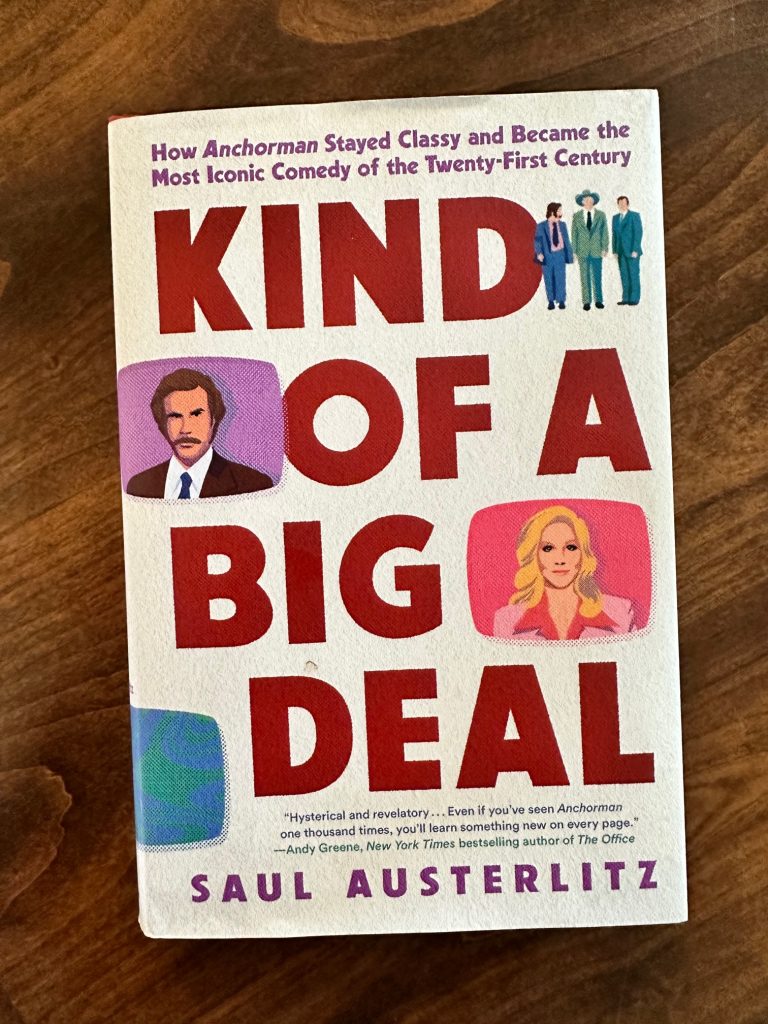 I usually enjoy reading books written by journalists because their points of view are almost always well-researched and in-depth. Recently, I read a book written by a professor that was just as well-researched and in-depth – almost to the point of obsessive. Written by Saul Austerlitz, an adjunct professor of writing and comedy history at NYU, Kind Of A Big Deal: How Anchorman Stayed Classy and Became the Most Iconic Comedy of the Twenty-First Century is a comprehensive look at the movie, Will Ferrell’s rise to and from Saturday Night Live, aggressive misogyny, how we look at films differently post-MeToo, and how Ron Burgundy became such a popular character that he almost became a real person. “Whether we love Ron, despise him, or are uninterested in him, we might acknowledge that he is the rare character to take on a meaning and significance beyond the story in which we find him.”
I usually enjoy reading books written by journalists because their points of view are almost always well-researched and in-depth. Recently, I read a book written by a professor that was just as well-researched and in-depth – almost to the point of obsessive. Written by Saul Austerlitz, an adjunct professor of writing and comedy history at NYU, Kind Of A Big Deal: How Anchorman Stayed Classy and Became the Most Iconic Comedy of the Twenty-First Century is a comprehensive look at the movie, Will Ferrell’s rise to and from Saturday Night Live, aggressive misogyny, how we look at films differently post-MeToo, and how Ron Burgundy became such a popular character that he almost became a real person. “Whether we love Ron, despise him, or are uninterested in him, we might acknowledge that he is the rare character to take on a meaning and significance beyond the story in which we find him.”
Austerlitz takes a sociological look at a movie that is quoted more often than we realize because the lines have become such a part of the lexicon that it’s easy to forget where they initially came from. The book begins with background on Ferrell’s career which started with (wait for it) a news internship at a local station in Orange County. That job led to him joining a sketch-comedy group called the Groundlings, and then to SNL which is where he met writer Adam McKay (his co-writer for Anchorman and subsequent films).
But this book is not solely about Ferrell and Anchorman. The aforementioned misogyny theme runs rampant, as well as similarities between Burgundy and George W. Bush. “Both Ron and W. mangle, and accidentally poeticize, the English language.” When I read that sentence I laughed out loud. Throughout the book, Austerlitz emphasizes the chauvinism that went on in 1970s newsrooms – which, of course, is satirized in Anchorman – and how the arrival of Jessica Savitch changed everything. Another theme is how the news format has changed over the years to include the “Eyewitness News model” (visual stimulation like car chases and fires) and “Happy Talk” (boring, fluffy segments). Also, the author points out how people used to only be able to get information from the news, whereas now a majority of the population leans on social media for up-to-date information (another cultural shift).
While Kind Of A Big Deal is an in-depth account of how Anchorman came to be, it’s not an oral history like Alright, Alright, Alright which is equal parts analysis and current interviews from the cast: https://lauralieff.com/alright-alright-alright-2/ Instead, Kind Of A Big Deal goes beyond the casting process and wardrobe (although those chapters are very interesting) as it discusses the cultural themes mentioned above and the history of the performers. (Austerlitz uses the term “performers” way more often than “actors”). He also talks about the improv pivoting that was required for the movie to be successful. “This spirit of creative generosity came to include all the performers, who embraced the freedom to reimagine the film one line at a time.”
I think Anchorman is hilarious – which is why I bought this book – but I doubt the movie would be made today. It’s meant to be a satire about a chauvinistic period that, at the time, was thought to be in the past. As Austerlitz points out, “When Anchorman came out in 2004, it was perhaps easier to collectively convince ourselves that we were in a kinder, gentler era in which blatant misogyny and hatefulness were no longer acceptable adult behavior.” Because times haven’t changed, some aspects of the movie may strike more nerves now than it did 19 years ago.
All that being said, the book is well-written, well-researched, and full of new information. There are some chapters that go on too long (for example the one about the Anchorman sequel) but overall, I enjoyed reading about a movie that remains extremely quotable that was written by an intelligent and observant professor who I assume is kind of a big deal at NYU.
Quotes
“One of the great and all-too-rare pleasures of teaching is to watch a student reconsider an opinion or impression that they held without knowing precisely why they held it.”
“Veronica rattled him, and his men’s-rights temper tantrum is perhaps the result of her having taken up residence, rent-free, inside his mind.”
“We are forever adjusting our response to movies we love, calibrating our reactions and finding ourselves changed by our experiences – personal and collective – each time we arrive again.”
“A good comedy is like a magic trick. A great comedy is like actual magic.”
“We have devoted an outsized amount of mental energy to carefully divvying up American history into decades, assigning ideas, attitudes, and ideologies to each ten-year segment. It is part and parcel of our collective desire to tidy what is inherently messy and lawless, to craft easy-to-follow narratives about the past.”
Fun Facts
Maggie Baird, who was one of Ferrell’s Groundlings classmates, is also Billie Elish’s mother.
After the initial test screening, Anchorman’s ending was rewritten.


Leave a Reply